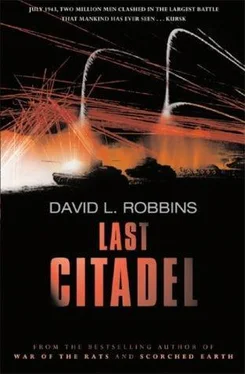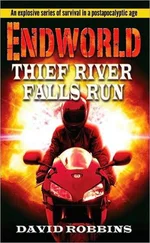What will happen to Vera? Katya wondered. The Germans will take her papers and maps and leave her body to rot. Villagers will come along to scavenge things from the wreck. They’ll bury her, and after the war there will be a memorial to Vera on the spot of the crash, a bust and a marble garden.
Katya thought, too, about the members of this fighting group killed in last night’s raid against the train. More than half of this druzhiny , gone. She wanted to ask if there’d been any word about what happened to Leonid, but she put that away for now. This was not the time to ask any of these men to address her concerns.
The mood under the trees was somber, even the horses stood still and dulled. So many lives taken all at once. The partisans sat without talking. Katya was tempted to warn the two young partisans who’d warmed up to her that their dead comrades might have been betrayed. She wanted to tell them how she, too, had lost friends to a possible traitor in their midst. She bit all this back. Daniel and Ivan carried the water and biscuit tin to Josef. He waved them off and kept his eyes on the patches of steppe showing through the wet branches.
Until dark, Katya sat alone. She changed into the new baggy clothes. Then she let her body rest, let Vera’s death sink far enough beneath her surface so she could continue on. That was what these partisans seemed to be doing, burying their dead in their hearts, making themselves accustomed to a world that was suddenly without their comrades. Silent and grieving, she watched the partisans sharpen and clean their weapons.
They were twelve miles from the front lines, but no enemy convoys or patrols came near their stand of trees. All daytime activity by the Germans seemed to have stopped. Plokhoi interpreted this to mean the battle would start soon.
After full night fell, Plokhoi led the remains of his band out of the trees. Katya hoisted herself gingerly into her saddle. The moon was shunted deep behind dense clouds as they rode, a shrouded midnight.
Katya rode in the thick of the pack, surrounded by Daniel, Josef, and Ivan. Her horse was sure-footed and strong, well fed. These partisans were obviously receiving supplies, with support and food from both the villages and the Night Witches’ air-drops. The men bristled with weapons and ammunition. Colonel Bad even had a radio, something very few partisan cells could boast. This must be a key group, and a good one, to operate right under the Germans’ noses like this. For them to fail so badly as they did against the tank train, something was rotten. Plokhoi must be aware of that.
They rode west, away from Borisovka. Daniel whispered to Katya that they were going to the villages to recruit, to regain their strength.
Somewhere in the night, Katya heard planes high up in the quilted clouds. Her spirit leaped for a moment, she closed her eyes to listen to the engines. These were not the popping motors of her night-bombing squadron on another mission. These were bigger planes, American-made Boston A-20s, and fighters, Yak-9S in escort.
Katya and all the partisans reined in their horses to watch the restive black world around them. Colonel Plokhoi sidled up next to her, a wild look in his eyes. Then, no more than five miles behind them, around Borisovka, the night blistered into orange and yellow flashes. She kept a tight rein on her horse, but the animal did not flinch at the bomb blasts and firelights. The horse was used to this.
Plokhoi wheeled his mount around to see the Soviet air raid better. He shouted over the explosions, unconcerned he might be heard by any Germans in the area.
Are you sure you don’t want to go home, Witch?’ He leaned closer to her. ‘I can smell it, you know, I can tell you!’
The partisan leader raised one arm into the air and shook a grimy fist.
‘Goddamn!’ he bellowed. ‘Goddamn, here it comes!’
July 3
0700 hours
Vladimirovka
beside the Oboyan road
Valentin’s boot tapped on Dimitri’s left shoulder. Then the hard toe nudged the nape of his padded helmet. Dimitri hauled back on the left lever and shoved the right one forward. The tank spun into a left-hand turn, slipping slightly, Dimitri sensed the mud under his treads. He brought the tank out of the turn and stomped the clutch, jamming the shift knob into fourth, the T-34’s highest gear. The transmission grumbled. Dimitri leaned down for his hammer but the General did not like to be struck and complied, the gears meshed. Dimitri floored the accelerator and the tank bounded along the ridge at thirty miles an hour, top speed.
All hatches were closed. Dimitri peered into a gash of gray-green and bouncing world through a small periscope. The designers of the T-34 didn’t put much stock in the discretion of the driver. His little, horizontal, mirrored view of the road made what bits he could see look like he was driving through a toy world. For the most part, the driver was forced to rely on his commander to tell him when and where to turn. Even the commander’s vision was limited; he sent his tank charging into a battle he, too, could barely observe. The commander peered through a periscope or a telescope, which provided him no more than a fourteen-degree-wide outlook, pressing his forehead and eyes against poor rubber pads that did little to keep light out of the optics. In addition he had one small armored port at shoulder height and a pistol port below that. Buttoned up like this, the T-34 was a collection of blind spots. Running this morning shut tight as a tin, the General’s insides were humid and smelly, piquant with perspiration and temper.
Valentin rested his feet on Dimitri’s shoulders, guiding the tank with his heels and toes because he was busy using the intercom for other duty. He was yelling at the loader Pasha.
‘No, no, no, the other bin! The other bin! I want AP! AP, Private! Get three ready. Now, do it, go, go!’
Dimitri kept the tank barreling ahead straight, listening to his son holler at the burly teenager while the boy scrambled for the ammunition. Pasha struggled on his knees, stripping back the neoprene matting that lay across the floor bins, digging down in them for the correct shells; this time Valya wanted solid-shot armor-piercing rounds. Somehow Pasha had managed to grapple from the floor the wrong ammo, a heat shell, a high-explosive antitank round. The T-34 carried seventy-seven rounds: nineteen of armor-piercing, fifty-three of high-explosive, and five of antipersonnel. Only nine of those rounds were easily accessible, on racks located left and right on the turret wall. Once those shells were expended, the loader had to root around under the floor mat into the eight storage bins beneath their feet. When the tank was moving at full speed, swaying and hopping the way it was now, the loader’s job was very difficult.
Valentin’s foot crunched into the middle of Dimitri’s neck. This meant stop, fast. Dimitri downshifted and hit the brakes. He brought the General to a skidding halt. No sense aggravating his testy son any more than he already was.
Valya’s voice swelled in the intercom. ‘Load AP!’
Behind and above Dimitri, Pasha rose from his knees to slam a shell into the breech. Valentin hit the electrical traverse and the turret began to whir and pivot. The turret walls, the dials, sights, and controls, the thick breech of the big main gun, all began to swing to the right. But Valentin’s and Pasha’s seats did not move. Valya’s feet left Dimitri’s shoulders, he had to stand and dance with the turret whenever he swung it around. This was a major design flaw in the T-34; the seats for the commander and loader were not mounted to the turret itself but to the ring of the chassis, so that the two had to skitter around with the swiveling breech and the firing controls whenever the turret was turned. Dimitri looked over his shoulder to watch his son. The boy contorted himself to keep his eye on his range telescope and at the same time twirl the elevation flywheel to raise the main gun to match his range to the target. At Valya’s feet, Pasha was folded again into the floor of the tank, he had the rubber mat in a shambles looking for two more AP rounds to satisfy his sergeant.
Читать дальше












